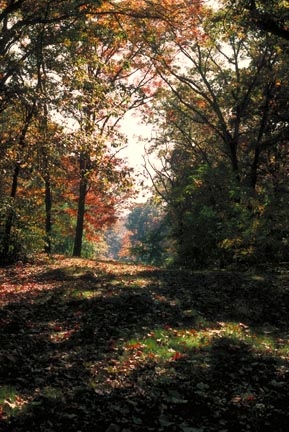UK Research on Global Climate Change Gains Notice
UK Research on Global Climate Change Gains Notice

As worldwide interest in the topic of global climate change increases, so, too, has there been an increase in research related to its effects. Much of that research has focused on areas where changes are occurring noticeably and rapidly, such as in the Antarctic.
But researchers at the University of Kentucky College of Agriculture have completed a nationally hailed research project that looks at the not-so-noticeable impact of climate change in an area that has gotten little attention: the forests in temperate regions.
“Temperate deciduous forests have received much less attention, but it is necessary to document potential changes in these systems for equally important economic, aesthetic and ecological reasons,” said Janet Lensing, who spearheaded the study while a doctoral student in the UK Department of Entomology.
Specifically, Lensing and her adviser, UK entomologist David Wise, took a look at how altered rainfall might affect the decomposition of leaves that litter the forest floor. Even more specifically, the pair studied how rainfall changes might alter the indirect effects of a predator – in this case, spiders – in the decomposition process.
While fungi are the primary decomposers of leaves, fungi are grazed upon by primitive insects called springtails. Springtails are the prey of spiders. Together, they make up a complex food web in which changes at one level can have an indirect effect on other levels, Wise said.
“One thing ecologists are realizing now is that if we want to understand how global climate change is going to affect complex ecosystems … we have to look at how changes in rainfall, temperatures and so on will affect the complex set of species interactions in which indirect effects can be very strong,” Wise said.
To conduct the project, Lensing set up plots in hardwood forests in the Berea College forest in central Kentucky and manipulated the rainfall in those plots to mimic the extremes predicted by global climate change models. She also reduced the number of spiders from the natural level and then looked at how higher or lower rainfall amounts affected the spider’s role in the decomposition process.
“In this experiment, we show that spiders have a completely different impact on the rate of litter decay depending on rainfall,” Lensing said. “We found that spiders had little impact on decay rates under conditions of abundant rainfall. Under low rainfall conditions, though, spiders accelerated the rate of litter decay.”
The study’s finding confirmed the hypothesis that Lensing and Wise developed while planning the project. Results obtained by a previous doctoral student suggested that spiders may accelerate litter decay under drought conditions.
“So in one way I was not surprised by the findings,” Lensing said. “In another way, though, the results of this experiment were very surprising. The food web in the leaf litter is very complex and made up of many different groups of arthropods. It is remarkable to me that a change in rainfall can affect this one pathway of spiders, springtails and litter decay within this complex food web and that spiders can impact litter decomposition differently depending on rainfall amounts.”
The results are significant because they draw attention to “the fact that predicting the consequences of changes in even one climatic factor may be difficult due to the combination of direct and indirect effects that may occur,” Lensing added.
The UK study has become the focus of national attention in recent days, with results published in The Proceedings of the National Academy of Sciences (USA) and featured in The New York Times. Scientific American magazine is also expected to highlight the study.
“These results are very exciting both in terms of gaining basic ecological knowledge about this complex food web and also in terms of exploring the potential consequences of climate change,” Lensing said.